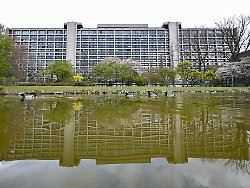Tuesday, November 9th, 2021
Possibly billions
Will the reconstruction of the Bundesbank be more expensive than the ECB headquarters?
The headquarters of the Bundesbank in Frankfurt are not only to be refurbished, but also expanded. That will cost a lot of money – possibly well over a billion euros. However, a “reliable cost estimate” has only been announced for 2023.
According to information from the “Handelsblatt”, the renovation and expansion of the Bundesbank headquarters in Frankfurt could cost billions. The project will likely be “considerably more expensive than the headquarters of the European Central Bank (ECB),” writes the newspaper. When asked, the Bundesbank announced “a reliable cost estimate” and a detailed schedule for the year 2023.
The new ECB building in Frankfurt’s Ostend, which was officially opened in March 2015, had devoured 1.3 billion euros. Previously, it was estimated at 850 million euros. But building materials and services became more expensive, and the integration of the listed wholesale market hall into the new ECB building was more complex than expected.
The Bundesbank, which currently has several locations in Frankfurt, wants to create space for 5,000 employees on the premises of its headquarters. The main building, which was built between 1967 and 1972, is also to be extensively renovated. Around 2000 employees will move to downtown Frankfurt for the time of construction.
“The campus project is still in the planning phase and important decisions have not yet been made, so that the question of the expected total costs cannot yet be answered reliably,” said the Bundesbank. “The planning has begun for the new buildings designed in the architecture competition. In 2023, the final decision on the building project will have to be made on the basis of a cost estimate that will then be available.”
The Bundesbank stated that it considered “striking comparisons with previous construction projects (…) to be misleading”. Between 2016 and 2020 alone there were increases in construction costs of four to five percent annually. In addition, “the requirements for public construction projects have changed substantially, especially with regard to ecological sustainability,” explained the central bank. According to the previous planning, the new buildings should not begin until 2024 at the earliest. The Bundesbank currently expects the new buildings to be moved into at the beginning of the 2030s.
